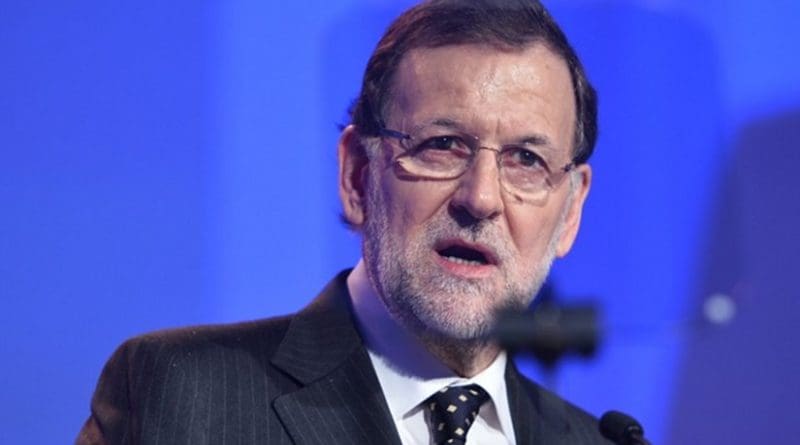Spain: Rajoy Says Europe And Latin America Should Work Together For Freedom And Democracy
Acting President of the Government, Mariano Rajoy, reaffirmed Spain’s commitment to Latin America at an international seminar held on the 80th birthday of the writer Mario Vargas Llosa. He also highlighted the “times of change” being experienced in Latin America, a process that “will not be complete without freedom in Venezuela”.
In his opening speech, the acting Rajoy praised the Peruvian writer. “He forms part of the common heritage of the universal literature from Latin America and Spain. He is our only living Nobel Prize laureate and a hero of freedom who has made Latin America, Spain and the Hispanic world great around the globe,” he said.
Rajoy said he believes that Mario Vargas Llosa “has not lived a blinkered life in literature but has rather been energized by it; he has not been content with simply reading the book of the world and accepting it as it is but has rather decided to transform it using the creative power of the word, to which he has added the courage of political action”.
Rajoy added that, in his 80 years of life, Mario Vargas Llosa has defended the values of “commitment, discipline, effort, perseverance and hard work, always standing against the arbitrary and fighting against dictatorships and populist movements”.
State policy on Latin America
Rajoy stressed that “Spain cannot be understood without Latin America and without the Latin American people”. The dual nature of Spain, as a European and Ibero-American country, encourages us to implement a “genuine State policy on the region agreed upon with the main political forces”. “We have come to understand our relationship with Latin America as a line of continuity and the successive governments in Spain have a duty to look after it and develop it further,” he said.
Rajoy said that over the last decade, Latin America has become a “more prosperous” region, the middle classes have grown and now demand public policies and services “that the governments of Latin America must deal with” so as not to generate dissatisfaction among their people.
This new reality, warned Rajoy, is not all too different from other parts of the world, including Europe. “There is a certain degree of popular disaffection towards politics and the party system, and we have a duty to strengthen the work of politicians and dignify politics. Anything else will fuel the populist movement and extra-democratic solutions, the evils of which we already know,” he said.
Latin America, he said, is a continent on which democracy has been consolidated. However, “the threats of populism, citizen insecurity, unequal opportunities and unequal socioeconomic conditions still hang over its head.” According to the President of the Government, Spain “has always been firmly committed to supporting a stronger role for the Rule of Law and democratic institutions” in a Latin America that is “so different” from that of the 1990s.
Exemplary integration
Rajoy recalled that at least 2.5 million Latin Americans now live in Spain and that Spanish nationality was granted to over half a million of those between 2012 and 2015 alone, “an all-time record”. Rajoy described the integration of this group into Spanish society as “exemplary” and underlined their contribution to the Social Security system and the pension system.
“They share a life project in common with us, which we call Spain; in Madrid, in Andalusia, in Catalonia or in the Canary Islands. They are a fundamental part of our future,” he said.
Meanwhile, he added that almost 1.5 million Spaniards currently live in Latin America, having found there a “horizon of freedom”. “This is the Hispanic world I believe in, that of freedom and opportunities”, said Mariano Rajoy, who believes that the Hispanic people on the two sides of the Atlantic have built mature, open and multicultural societies.
Freedom in Venezuela
Rajoy stressed that the whole world lives in “changing times”, Latin America included.
In this regard, he referred to the “open and transformational profile” reinstated in Argentina and to the new period being embarked upon in Cuba, where “a full return to normality in relations with the United States will undoubtedly allow an improvement to material conditions for the Cuban people but also a change in their political outlook”.
However, Rajoy said that “the change will not be complete in Latin America without freedom in Venezuela” and advocated support for that “great nation” so it can achieve that goal. Furthermore, he highlighted how he was the first acting government leader in the world to receive a visit from the wives of the political prisoners Leopoldo López and Antonio Ledezma, “whom I wish to remember today with affection and solidarity, as well as all the people of Venezuela, who deserve a better future”.
Visa exemption
Rajoy said that Spain will continue defending the interests of Latin America in Europe; for example, updating the agreements with Mexico and Chile, concluding the agreement with Cuba and creating an agreement between the European Union and MERCOSUR. Spain will also continue supporting the various integration processes in the region, he said.
“For my government, it was fundamental for Latin America to hold a leading position on the European Union agenda; for many reasons, but especially because we are convinced that, if Europe and Latin America work together on defending and promoting the values we share, the cause for freedom and democracy in the world will gain great strength, he said.
Rajoy added that it was his government that, in December 2013, obtained European consensus for the exception from Schengen visas for citizens of Peru and Colombia. “It was an act of justice that has now become a reality and we hope that other Latin American countries can share the same condition in the near future,” he concluded.

